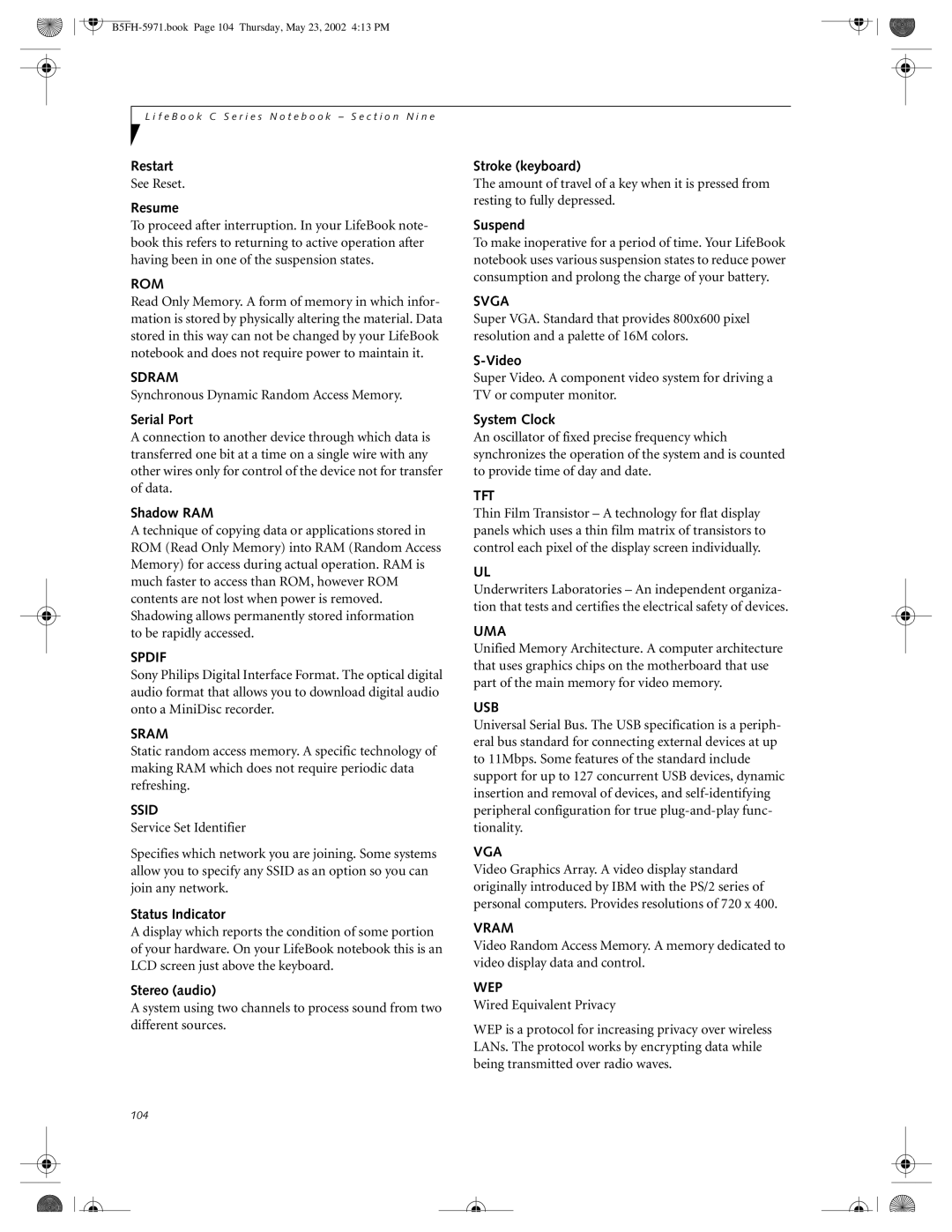
L i f e B o o k C S e r i e s N o t e b o o k – S e c t i o n N i n e
Restart
See Reset.
Resume
To proceed after interruption. In your LifeBook note- book this refers to returning to active operation after having been in one of the suspension states.
ROM
Read Only Memory. A form of memory in which infor- mation is stored by physically altering the material. Data stored in this way can not be changed by your LifeBook notebook and does not require power to maintain it.
SDRAM
Synchronous Dynamic Random Access Memory.
Serial Port
A connection to another device through which data is transferred one bit at a time on a single wire with any other wires only for control of the device not for transfer of data.
Shadow RAM
A technique of copying data or applications stored in ROM (Read Only Memory) into RAM (Random Access Memory) for access during actual operation. RAM is much faster to access than ROM, however ROM contents are not lost when power is removed. Shadowing allows permanently stored information
to be rapidly accessed.
SPDIF
Sony Philips Digital Interface Format. The optical digital audio format that allows you to download digital audio onto a MiniDisc recorder.
SRAM
Static random access memory. A specific technology of making RAM which does not require periodic data refreshing.
SSID
Service Set Identifier
Specifies which network you are joining. Some systems allow you to specify any SSID as an option so you can join any network.
Status Indicator
A display which reports the condition of some portion of your hardware. On your LifeBook notebook this is an LCD screen just above the keyboard.
Stereo (audio)
A system using two channels to process sound from two different sources.
Stroke (keyboard)
The amount of travel of a key when it is pressed from resting to fully depressed.
Suspend
To make inoperative for a period of time. Your LifeBook notebook uses various suspension states to reduce power consumption and prolong the charge of your battery.
SVGA
Super VGA. Standard that provides 800x600 pixel resolution and a palette of 16M colors.
S-Video
Super Video. A component video system for driving a TV or computer monitor.
System Clock
An oscillator of fixed precise frequency which synchronizes the operation of the system and is counted to provide time of day and date.
TFT
Thin Film Transistor – A technology for flat display panels which uses a thin film matrix of transistors to control each pixel of the display screen individually.
UL
Underwriters Laboratories – An independent organiza- tion that tests and certifies the electrical safety of devices.
UMA
Unified Memory Architecture. A computer architecture that uses graphics chips on the motherboard that use part of the main memory for video memory.
USB
Universal Serial Bus. The USB specification is a periph- eral bus standard for connecting external devices at up to 11Mbps. Some features of the standard include support for up to 127 concurrent USB devices, dynamic insertion and removal of devices, and
VGA
Video Graphics Array. A video display standard originally introduced by IBM with the PS/2 series of personal computers. Provides resolutions of 720 x 400.
VRAM
Video Random Access Memory. A memory dedicated to video display data and control.
WEP
Wired Equivalent Privacy
WEP is a protocol for increasing privacy over wireless LANs. The protocol works by encrypting data while being transmitted over radio waves.
104
